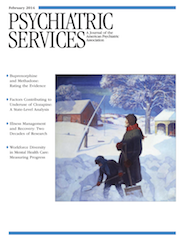Perceived Trauma During Hospitalization and Treatment Participation Among Individuals With Psychotic Disorders
Abstract
Objective
This study assessed the association of perceptions of traumatic experiences during psychiatric hospitalizations and treatment participation.
Methods
Participants (N=395) in the Suffolk County Mental Health Project, who had been admitted for the first time for a psychotic disorder ten years earlier, were interviewed. The authors examined associations of perceived trauma and distressing or coercive experiences during hospitalizations in the past ten years with patient characteristics and treatment participation.
Results
Sixty-nine percent of participants reported perceived trauma. Perceived trauma was more common among females versus males and homemakers versus full-time workers. It was not associated with treatment seeking or time in treatment. However, reporting forced medication was associated with reduced time in treatment, especially for persons with schizophrenia spectrum disorders.
Conclusions
Although perceptions of trauma during psychiatric hospitalization were common, they may be unrelated to treatment participation. However, there was modest evidence of a link between coercive experiences and reduced treatment time.



